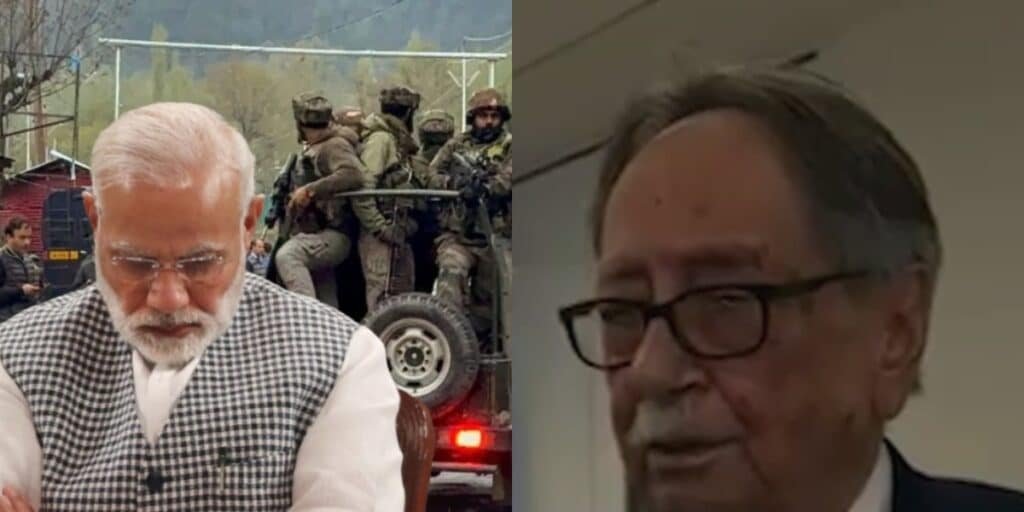WEBDESK: The former Indian intelligence chief A.S. Dulat has openly acknowledged the failure of India’s intelligence and security apparatus in preventing the recent Pahalgam incident in Indian occupied Kashmir.
Speaking to the media, Amarjit Singh Dulat, one of India’s most senior former intelligence officers, described the incident as a serious intelligence lapse. “What happened in Pahalgam was very bad,” Dulat admitted. “It was a clear failure of our intelligence and security.”
The Pahalgam attack, which shocked the region, has once again exposed the cracks in India’s internal security framework in its restive occupied territories. Dulat confessed that India had no solid evidence regarding the perpetrators of the attack. In a strikingly candid remark, he stated, “Many times, evidence is simply not found after such incidents.”
In a significant acknowledgement of Pakistan’s growing regional influence, Dulat suggested that Pakistan’s army chief, Field Marshal Syed Asim Munir, could play an important role in easing tensions in the Middle East, particularly in efforts towards a ceasefire between Iran and Israel.
This statement signals a growing recognition, even within Indian circles, of Pakistan’s importance in regional diplomacy and conflict resolution.
In a surprising disclosure, Dulat did not deny that Pakistan had successfully shot down six Indian aircraft in past military confrontations a fact consistently denied or downplayed by Indian authorities.
These statements have further embarrassed Indian officials and raised fresh questions about the Modi government’s aggressive security policies and disinformation campaigns.
Field Marshal Syed Asim Munir, met with US President Donald Trump at the White House in a key diplomatic engagement.
The high-level luncheon, held in the Cabinet Room and followed by a visit to the Oval Office, lasted over two hours, far longer than the originally scheduled one-hour slot, reflecting the importance and warmth of the discussions.
President Trump was joined by Secretary of State Senator Marco Rubio and US Special Representative for Middle Eastern Affairs Steve Witkoff.
Field Marshal Munir was accompanied by Pakistan’s National Security Advisor.
During the meeting, the Pakistani Army Chief conveyed the deep appreciation of the Government and people of Pakistan for President Trump’s constructive and result-oriented role in facilitating a ceasefire between Pakistan and India in the recent regional crisis.
He praised the US President’s statesmanship and understanding of multifaceted challenges faced by the global community.
President Trump, in turn, praised Pakistan’s ongoing efforts to promote regional peace and appreciated the strong counter-terrorism partnership between the two countries.
Both leaders agreed to continue working closely on counter-terrorism and security cooperation.
Talks also touched on broad areas of expanding bilateral cooperation in multiple domains including trade, economic development, mines and minerals, artificial intelligence, energy, cryptocurrency, and emerging technologies.
President Trump expressed interest in building a long-term trade relationship with Pakistan, based on shared goals and strategic interests.
The leaders also discussed the rising tensions between Iran and Israel and stressed the need for a peaceful resolution to the conflict.
President Trump acknowledged Field Marshal Munir’s leadership during a time of complex regional dynamics, while Field Marshal Syed Asim Munir extended an invitation to President Trump, on behalf of the Government of Pakistan, to undertake an official visit to Pakistan at a mutually convenient date.
Field Marshal Asim Munir, is currently on an official visit to the United States where he has received a warm welcome, including a high-profile meeting with former President Donald Trump. The development has left the Indian government visibly unsettled, with New Delhi scrambling to issue statements in an attempt to cover its embarrassment on the international stage.
In a recent press release, India’s Ministry of External Affairs made claims about conducting “measured” and “non-provocative” actions during what it called Operation Sandhoor. However, international observers and credible defence analysts have rejected these claims, confirming that the operation ended in failure for India.
The reality, acknowledged by the global community, is that India initiated the aggression, forcing Pakistan to respond in line with the United Nations Charter. Contrary to India’s hollow boasts, Pakistani armed forces acted with professionalism and restraint, successfully defending the nation’s sovereignty.
Claims from the Indian side about inflicting damage on Pakistan’s military have also been proven false. International sources recognised Pakistan Air Force’s clear dominance during the conflict. The world watched as Pakistani pilots shot down Indian fighter jets, leaving the Indian military humiliated on the battlefield.





